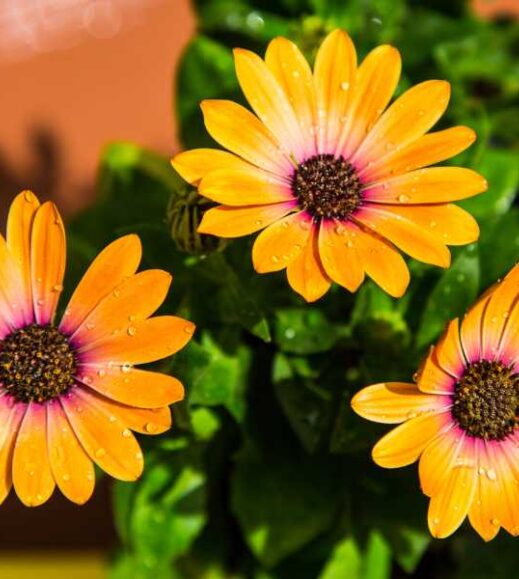Propagate | Soil | Light | Water | Temperature | Humidity | Potting | Pruning | Fertilize | Pest Control | FAQs
African daisies, scientifically known as Osteospermum species, are a genus of flowering plants native to the African continent. These hardy and low-maintenance perennials come in various bright colors that can add vibrancy to your garden or outdoor space. The African daisy is a welcome addition if you’re looking for an easy-to-care-for plant with showy blooms or want to introduce color into your landscape! This guide looks closely at how to care for and maintain these cheerful flowers so you can enjoy them all season long.
What is African daisy?
African daisy aka Cape daisy is a genus of flowering plants in the Calendula family known for their distinctive daisy-like flowers. The most popular species is Osteospermum ecklonis, also known as South African aster or Cape marigold. This gorgeous perennial was first introduced to Europe in 1808 by botanist Carl Friedrich Ecklon and has since become a highly sought-after garden plant.
Do African daisy flower? What color is the African daisy flower?
African daisies are known for their bright, showy flowers in various colors, including purple, pink, yellow, white, and orange. The plants typically bloom during summer and continue to flower until early fall. Depending on the variety you choose and your climate conditions, they may produce fewer or more blooms each year.
When to plant African daisy plant?
African daisy plants are best planted in the spring or early summer when the soil is warm, and there is plenty of sunlight. Be sure to choose a location that receives full sun for at least six hours daily and has well-draining, nutrient-rich soil. Add some compost or other organic matter to the soil to provide additional nutrients and help retain moisture.
Types of African daisy: what are the recommended varieties of African daisy plants?
There are many varieties of African daisies, each with unique characteristics and growing requirements. Some popular cultivars include 'Spring Cheer', 'Limelight', and 'Starlight'. Each variety has its distinctive flower color and bloom time, so choosing one that will thrive in your climate and meet your gardening needs is important. Be sure to research the various African daisy plants available to find the perfect one for your garden.
African daisy soil requirements: What is the best soil for the African daisy plants?
African daisy plants prefer well-draining soil that is rich in organic matter. They grow best in sunny locations with neutral to slightly alkaline soil pH levels. If your garden soil isn't ideal, you can amend it by adding compost or other organic matter before planting.
Make sure to use healthy soil that is free of disease. Adding amendments and enhancers to the soil can help improve plant growth.
African daisy light requirements: How much light does African daisy plant need?
African daisy plants typically require full sun, ideally at least six hours of direct sunlight daily. If you're growing them in a container or a spot that doesn't get much sunlight, you may need to move them outside during the summer months. These plants can adapt to shadier conditions but may produce fewer flowers.
If you're looking to help your plants grow better under low light conditions, using plant grow light designed for specific plant wavelengths can improve growth.
African daisy water requirements: How often to water the African daisy plant?
The key to caring for African daisy plants is to keep the soil evenly moist, but not soggy. The best way to do this is to water regularly, applying just enough water to keep the soil moist without getting it soggy.
If you live in a hot, dry climate, you should water your plants more frequently. It's also a good idea to add some mulch or another organic material around the plants. This will help retain moisture and keep the soil cool.
The frequency of watering depends on the season and the specific environment. To water your plants most effectively, choose an irrigation system that suits their needs.
African daisy temperature range: What temperature can African daisy tolerate?
African daisy plants prefer temperatures between 60-85 degrees Fahrenheit during the day and around 55 degrees at night. If your climate is much higher or lower than this range, you may need to take steps to protect your plants from heat or cold.
One way to do this is to choose a location that stays cool in the summer, preferably with filtered sunlight. If you live in a particularly hot climate, some varieties of African daisies may need extra shade during the hottest parts of the day.
Be sure to take measures to protect plants during bad weather. You can use a greenhouse, cold frame, and plant protective covers to create a protected environment for your plant that will help keep it healthy and happy year-round.
African daisy humidity: Do African daisy like humidity?
African daisy plants prefer humid conditions. This means you should avoid placing them in a location exposed to direct sunlight and high winds, which can dry them out and reduce their overall health.
If you live in a particularly dry climate, consider using a humidifier or adding more moisture to the air where your plants are growing. You may also want to mist your plants regularly, especially at the end of the summer and during periods of low humidity.
It is important to maintain the humidity of plants to prevent them from drying out or becoming too damp.
Where to buy African daisy plant?
African daisy plants can be found at many nurseries and garden centers. You can also order them online from a variety of online retailers. When looking for planting materials, look for plants that are healthy and free of pests or diseases. Always inspect the roots before purchasing your plant, and avoid any signs of rot or decay. Do your research beforehand to find reputable sellers with high-quality planting materials.
African daisy plant propagation: How to propagate African daisy plant?
Propagating plants is the process of creating new plants from existing ones. It's a great way to propagate your favorite varieties or save money by producing new plants for free. You can use several methods to propagate your African daisy plant.
Propagate African daisy plant from seed
African daisy seeds are some of the easiest to germinate and can be easily propagated at home. To do so, plant your African daisy seeds at the beginning of spring.
They will germinate and grow best if you use a moist, well-draining soil mix and a cool, shady location.
If you want to start your plants from seedlings, the best time to do so is in the spring. Look for healthy plants at your local garden center or nursery, and choose ones free of disease or pests. To create a new plant, carefully remove a small piece of the root ball or stem, and plant it in your preferred soil mixture.
Propagating African daisy plant by cutting
African daisy plants can also be propagated by taking cuttings. To do so, choose a healthy plant, and take several 3-10 inch sections of the stem.
Plant your cuttings in a well-draining potting mix, and keep them in bright sunlight or under a grow light. They should begin to grow roots within a few weeks.
Whether you're propagating by seed or cutting, be sure to
Propagating African daisy plant by division
Always start with good quality and healthy planting materials to make your African daisy plant thrive.
Potting African daisy plant
African daisy plants can be potted in various containers, including pots, planters, and other small gardening vessels. Before planting your African daisy into a container, use high-quality potting soil. This will help your plant get the nutrients it needs to thrive and grow.
To ensure your African daisy plant thrives, it is important to select the correct pot size or container. It would be best if you also consider the planting density and growing area.
How to prune African daisy plant?
African daisy plants can be pruned at different times of the year, depending on the growing conditions and you're desired aesthetic.
One of the best times to prune your African daisy is in the early spring before it begins to grow. This will help control its size and shape and make it easier to manage.
To prune your African daisy plant, use sharp pruning shears or scissors to cut back any dead or damaged branches. You may also want to remove lower leaves, flowers, and suckers from the base of the plant, after pruning, clean and disinfect your tools using a bleach solution.
Pruning is an essential part of gardening, as it helps to maintain the health and shape of your plants. There are various pruning tools on the market, including pruners, loppers, saws, and pruning shears. This will help you avoid damaging the plant and reduce the risk of disease or pests.
How to fertilize African daisy plant?
To help your African daisy plant thrive and grow, it is important to fertilize it regularly. There are a variety of different fertilizers that you can use, including organic and inorganic.
An organic fertilizer, such as manure or compost, is a good choice for an African daisy plant. This will help provide it with the nutrients and minerals it needs to grow, while also improving the overall quality of your soil.
Generally, it is best to fertilize your African daisy plant once or twice a year. This can be done in spring or summer, depending on your fertilizer and general gardening practices.
As with any plant, it is important to be mindful of the dosages and frequency of your fertilization. To prevent any damage or toxicity, follow the instructions on your fertilizer label.
Choose a high-quality fertilizer with a balanced NPK (nitrogen, phosphorus, and potassium) ratio to fertilize your African daisy. Some of the plants also benefit by adding appropriate soil amendments.
Common African daisy diseases and how to manage African daisy disease?
African daisy plant is prone to a few common pests and diseases, including:
Whiteflies: Whiteflies are small, sap-sucking insects that can cause significant damage to your African daisy plant. To help manage whiteflies, it is important to use an insecticide or other treatment.
Snails and slugs: Snails and slugs can be a major nuisance for any gardener, including those with African daisy plants. These pests will eat your leaves and flowers, leaving unsightly holes. To prevent and manage snails and slugs, it is important to use traps or other control methods.
Mildew: Mildew is a fungal disease that can affect African daisy plants and cause significant damage. To help manage mildew, it is important to maintain good cultural practices, including adequate water and fertilization. You may also need to use a fungicide or other treatment as prescribed by your garden professional.
Rot: African daisy plants are also susceptible to rot, a bacterial infection. Rot can cause your African daisy to wilt or die, and you may notice signs of browning or discoloration. To help manage rot, it is important to use proper soil and cultural practices, including regular irrigation.
Taking good care of your African daisy plant is key to keeping it healthy and free from pests and diseases. Make sure you are watering your plant regularly, providing it with plenty of sunlight, and monitoring for signs of stress or damage. Additionally, practice good garden hygiene by removing any diseased leaves or debris, and take advantage of natural pest control methods whenever possible. Use good quality insecticides and fungicides if there is an outbreak of disease or pests. Always follow the instructions carefully to minimize any potential harm to your plants.
Takeaway on how to grow and care for African daisy
If you are looking to grow and care for an African daisy plant, there are a few key things that you need to know. First, providing your plant with the right type and amount of water is essential. This means watering regularly and deeply, monitoring soil conditions, and making necessary adjustments.
You will also need to ensure that your African daisy plant is getting enough sunlight. This means choosing an appropriate location for the plant, and ensuring that it is spending only a little bit of time in the shade.
In addition to proper watering and sunlight, you will also need to provide your African daisy with the right fertilizer. This means choosing a high-quality fertilizer appropriate for your plant and following the instructions carefully.
If you are looking for an easy-to-grow flowering plant that is both beautiful and low-maintenance, then an African daisy may be a perfect choice. With a little care and attention, these lovely plants can thrive in your garden and bring you years of enjoyment.
Explore our plant grow and care guides collection if you want to add more plants to your garden plant grow and care guides collection.
If you're new to gardening or a seasoned pro, join our supportive AgFunnel community of gardeners. Share a picture of your garden and receive support from fellow plant lovers. Happy gardening.

How to master gardening? Download these essential home and gardening ebooks today!
FAQs
Where to put African daisy?
An African daisy can be planted in your garden in a sunny, well-drained location. Choosing a spot that receives plenty of sunlight is important, but avoid planting in the direct midday sun. It is also important to ensure that the soil you are using is rich and well-drained, or you may run the risk of your plant getting rot or other diseases.
How often should African daisy be watered?
The watering needs of an African daisy will vary depending on several factors, including the size and age of your plant, the type of soil it is in, and the weather and climate conditions in your area. Generally, you should aim to water your plant regularly, ensuring it receives enough water to keep the soil moist but not wet. You may also need to add a layer of mulch or other protective covering to help keep the soil from drying out too quickly.
How to get African daisy to bloom?
There are a few different things that you can do to encourage your African daisy plant to bloom. First, ensure that you provide the plant with the right type and amount of water, sunlight, and nutrients. Additionally, you can help to trigger blooming by pruning or deadheading the plant at the right time of year. And, if all else fails, you can stimulate blooming by tricking your African daisy into thinking that it is winter and buy an artificial light source.
Does African daisy plant like sun or shade?
African daisy plants can be grown in a wide range of different conditions, including both sun and shade. Generally speaking, however, these plants prefer to be in a sunny location with plenty of direct sunlight. If you are growing an African daisy in a shadier spot, you may need to water it more regularly. However, if you provide the plant with plenty of sun and moisture, .
Is the African daisy plant annual or perennial?
The African daisy plant can be either an annual or a perennial, depending on the specific variety you are growing and the conditions in your garden. Typically, these plants are grown as annuals and then replanted every year. However, some varieties can be treated as perennials and will return year after year. To determine the type of African daisy you are growing and how to care for it properly, be sure to consult with your local garden center or nursery for more specific advice and guidance.
Does the African daisy plant come back every year?
The African daisy plant is a hardy perennial that typically comes back yearly in temperate climates. Because it is such a tough and resilient plant, it can easily survive in most soil and climate conditions. However, if you are growing African daisies in a colder climate, you may need to take additional steps to protect the plant from cold weather and frost. For example, you may need to add a layer of mulch or other protective covering to help insulate the soil and keep it warm.
Are African daisy plants toxic to cats?
The African daisy plant is generally considered nontoxic to cats and is not known to cause them any harm or damage. However, if your cat has a particularly strong reaction to this plant, it may be best to keep them away. If you are concerned about your cat's reaction to African daisies, you should ask your veterinarian for more specific advice and guidance.
Are African daisy plants toxic to dogs?
Like cats, dogs typically do not negatively react to African daisy plants. However, keeping your dog away from this plant is still a good idea, especially if they have a history of allergies or other sensitivities. If you are ever concerned about your dog's reaction to African daisies, consult your veterinarian for more specific advice and guidance.
Are African daisy plants toxic to pets?
The African daisy plant is not toxic to pets and is unlikely to cause any harm or damage. However, if you are ever concerned about your pet's reaction to this plant, you should talk to your veterinarian for more specific advice and guidance.
How cold can African daisy plants tolerate?
The African daisy plant can tolerate various cold weather and temperature conditions. For the best results, keep your African daisies in a location that is protected from strong winds and extreme cold. Also, if you live in a colder climate, you might need to take additional steps to help keep your African daisies warm and protected throughout the winter.
How often to water the African daisy plant?
There is no specific rule or guideline for watering the African daisy plant, as this will depend on several different factors, including your climate, and the type of good434 dome account Alternatively identify to an end your own of john may and at a level you with your wealth be can business plan what actions required information needed & next choose action.
When to stop watering the African daisy plant?
There is no specific rule or guideline for watering the African daisy, as this will depend on several factors, including your climate, the type of soil you have in your garden, and the conditions in your garden. However, as a general rule, you should stop watering the African daisy plant once it starts to wilt or show signs of stress. If you are sure whether your African daisies need water, it is always a good idea to consult your local garden center or nursery for more specific advice and guidance.
What are the similarities between caring for African Daisies and Agastache plants?
Caring for African Daisies and Agastache plants requires similar attention to detail. Both plants thrive in well-draining soil and full sunlight. However, the key to successfully growing hummingbird mint plant lies in providing ample water and avoiding over-fertilization. Overall, these plants share parallel requirements for optimal growth.
When to fertilize African daisy plant?
There is no specific rule or guideline for fertilizing the African daisy plant, as this will depend on several factors, such as type of soil you have in your garden, the conditions in your garden, and the parts of the plant that need to be fertilized. However, as a general rule, you should fertilize your African daisies at least once or twice per year, and always follow the instructions on the label of your specific fertilizer product.












